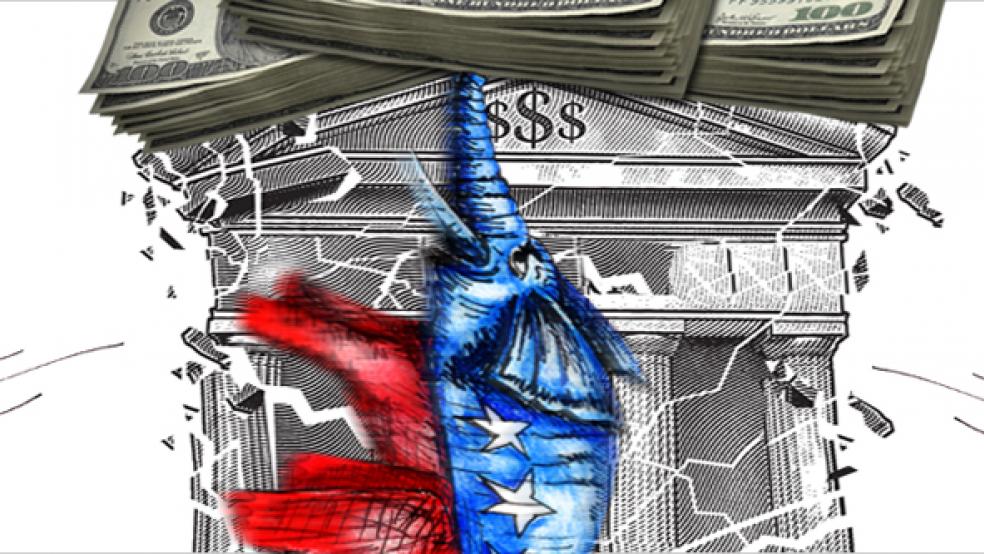From a conservative point of view, the best thing for Republicans to do is to stop playing chicken over the deficit and debt ceiling and accept a compromise with the Dems, even if it means accepting new revenues. Here’s why.
As I write this, the showdown over the debt limit has entered the firing squad stage where executioners point their weapons at a prisoner standing against a wall. Democratic and Republican negotiators have started firing rhetorical volleys at each other, even as catastrophic default by the United States Treasury slouches from unthinkable towards unavoidable. If the parties can’t or won’t compromise over the debt ceiling, then the markets, the economy and America’s credit standing will end up dead, and the only thing left standing will be the deficit. If that happens, I’ll blame Republicans—for letting the country down and betraying conservative economic principles.
Yes, of course, both parties share blame over the debt. But the only reason we are even discussing a default on U.S. debt is that Republicans have insisted on $2 trillion in debt reduction as a condition for supporting a $2 trillion debt ceiling hike—and then taken a negotiating stance that makes coming close to $2 trillion very difficult. The Dems have dutifully coughed up $1 trillion in spending cuts over 10 years and asked to be met partway by additional revenues. The Republicans, however, seem to believe they must oppose any revenue increase, even if accomplished by closing tax loopholes many of them have long sworn to eradicate. Risking a catastrophic default to preserve corrupt loopholes is not only stupid economics; it’s stupid conservative economics.
Think about it. What do conservatives want the debt ceiling negotiations to accomplish? I’d suggest these three goals:
- Shrink the government
- Avoid federal meddling in business decisions
- Close the deficit
Ironically, the best way to accomplish all three is to compromise with the Dems and get the deal done. Let’s go through those goals.
Shrink government
Writing for CNN.com, Senate Minority Leader Mitch McConnell promised to tell the President, “Americans didn't elect dozens of additional Republicans to the House last November because they wanted their taxes raised. They sent them here to reverse the runaway spending policies that failed.” For the Republican faithful, any increase in revenues funds the expansion of government, and that is anathema.
But that position ignores the fact that the Democrats have already put $1 trillion in spending cuts on the table. A trillion dollars out of the government budget over the next decade sounds like smaller government to me. In return, the Dems are asking for votes to close loopholes that subsidize corn growers and ethanol blenders, corporate jet manufacturers, ultra-high-income taxpayers, and oil and gas companies. All of them add far less revenue than the trillion-dollar spending cuts the Dems have tentatively agreed to. If the Republicans were to accept this compromise, or something similar, they could truthfully boast to constituents that they had shrunk government by billions and billions. That sounds like a win.
Avoid federal meddling
Every conservative economist believes government should not be in the business of steering business decisions. Federal subsidies—whether in the form of cash handouts or of tax breaks—do just that, favoring politically connected recipients or fashionable causes. They distort decisions best left to the free market.
And yet the tax breaks now in dispute are as distorting as any product of the Congressional cloakroom. There is no good reason that taxpayers should give special treatment to the makers of private jets, or brewers of ethanol, or oil refiners. The effect of the tax subsidies has been particularly perverse in the case of the 45-cent a gallon tax credit awarded to blenders of ethanol, as Jason Fichtner, of the libertarian Mercatus Institute pointed out in an interview with The Fiscal Times’s Judy Feldman:
These [ethanol] credits have done nothing to reduce the price of a gallon of gas and have actually raised the price of food, as the credit provides a perverse incentive for corn to be used for ethanol production instead of food production.
Many conservatives agree, ranging from President Bush’s economic adviser Gregory Mankiw, to “Gang of Six” Republican Senator Tom Coburn to Sarah Palin. “I think all our energy subsidies need to be re-looked at and eliminated,” the former vice-presidential candidate told reporters in response to a question about ethanol. “And we need to make sure that we're investing and allowing our businesses to invest in reliable energy products right now that aren't going to necessitate subsidies because, bottom line, we can't afford it.” Last month, 34 Republican Senators publicly agreed with Palin (if not in so many Palin-esque words) by voting in favor of a Coburn-sponsored amendment to eliminate the ethanol credit.
Clearly, at some point, conservatives understand that the benefits of getting Uncle Sam out of decisions that should be decided by the market outweighs the benefits of inflexible fealty to a no-tax pledge. The good news: there are plenty of loony tax expenditures to target besides ethanol.
Cut the deficit
Our massive deficit has all kinds of untoward consequences. It deepens our dependence on foreign lenders, puts our children in hock, and crowds other, worthier enterprises out of the capital markets. Any reasonable initiative that helped close that funding gap—either by cutting spending or raising revenues—should appeal tremendously to thinking conservatives.
Republican party dogma, however, declares raising taxes paradoxically reduces revenues by encouraging tax evasion and reducing growth. The only way to raise revenue is by cutting taxes. A number of conservative economists—among them Mankiw, Ronald Reagan’s budget director David Stockman and The Fiscal Times own Bruce Bartlett—believe this is as absurd as it sounds. In last weekend’s New York Times, Christina Romer, Obama’s former chief economic adviser, cited a study led by Berkeley economist Emmanuel Saez demonstrating that raising taxes does not in fact reduce output nearly as much as the Republican orthodoxy claims.
There’s one more reason conservatives should be happy to accept a compromise on the debt ceiling debate: Failure to strike a deal and to allow a default would be catastrophic. If you want to close the deficit, after all, the last thing you want is to plunge the economy back into recession. Kevin Williamson, deputy editor of the conservative National Review, encouraged his readers to consider the risk of playing politics with an ever expanding federal debt (let alone the possibility of default):
I would prefer to cut spending and raise taxes right now, to reduce the deficit as quickly as possible, to eliminate the deficit as quickly as possible, and to begin paying down the debt as quickly as possible. There are many prudential reasons for this, one of which is that I believe the risk of a major crisis in American public finances is very dangerous, more dangerous than is widely appreciated, and ameliorating that risk is worth the price of higher taxes.
If the Republicans compromise—with spending cuts and loophole closing—they can legitimately declare victory. They can say they forced Dems to cut spending as a condition of approving the debt ceiling increase; they won an agreement in which most of the deficit reduction came via spending cuts; and they saved the nation from a catastrophic default. The choice is clear: be a statesmanlike hero and claim a legitimate political triumph, or trigger a destructive economic calamity. Why is this hard?
More on the debt limit debate from The Fiscal Times:
What Debt Limit? Plan B is the 14th Amendment (The Fiscal Times)
Budget Talks Collapse over Demands to Raise Taxes (The Fiscal Times)
10 Things You Need To Know About The Debt Ceiling (The Fiscal Times)






